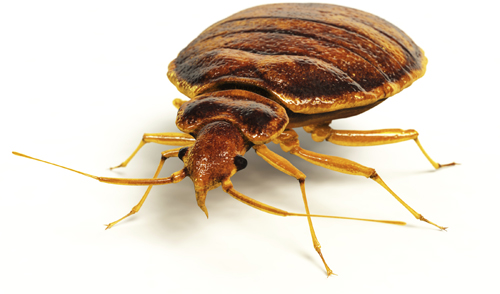Kings Exterminator Cincinnati: Efficient Bug Management
Wiki Article
A Malfunction of the Different Types of Bug Control Solutions
In the realm of parasite control, a wide variety of methods exist to combat the visibility and attend to of unwanted animals. As we browse via the varied landscape of pest control options, comprehending the intricacies of each approach comes to be extremely important in figuring out the most efficient program of activity.Chemical Pesticides
Chemical chemicals are typically used in bug control to effectively get rid of a large range of pests and other pests. These chemicals work by targeting the nerve system of the pests, disrupting their normal functions, and ultimately resulting in their death. Using chemical pesticides has been a staple in the parasite control market for years because of their performance and fast outcomes.
However, it is necessary to make use of chemical pesticides with caution as a result of their prospective harmful effects on the atmosphere and non-target varieties. Inappropriate application or overuse of these chemicals can cause air pollution, damage to valuable insects, and resistance growth in parasite populaces. As a result, it is essential to follow safety and security standards and policies when using chemical pesticides for bug control.
Biological Control Techniques
Taking into consideration the potential environmental effects and dangers related to chemical pesticides, biological control techniques provide an even more lasting approach to taking care of insect populations. Biological control entails making use of all-natural adversaries, such as bloodsuckers, virus, and killers, to subdue insect populaces. This approach is commonly more targeted, affecting only the specific pest species while minimizing damage to beneficial insects, human beings, and the environment.

One advantage of biological control is its long-term performance. Once developed, natural enemies can help regulate pest populaces continuously without the need for repeated applications of pesticides. Additionally, organic control is frequently extra economical and can help in reducing chemical resistance in pest populaces gradually. On the whole, biological control techniques provide a sustainable and ecologically friendly service to pest management.

Mechanical Insect Control
Mechanical parasite control entails the physical manipulation or removal of pests to manage their populaces efficiently. This technique is commonly used combined with various other insect control methods for detailed pest monitoring. One common instance of mechanical insect control is making use of catches to capture insects or rats. These traps can be set up in calculated locations where bugs are known to dwell, aiding to decrease their numbers.
One more mechanical strategy is making use of obstacles such as displays, fencings, or nets to block pests from entering specific areas. By literally protecting against pests from accessing a place, the possibility of infestations or damage can be considerably minimized. Additionally, manual techniques like handpicking insects off structures or plants can be efficient for smaller-scale invasions.
While mechanical bug control approaches can be important source labor-intensive, they supply a non-chemical alternative that can be eco-friendly and lasting. By targeting browse this site pests straight, mechanical control strategies can help maintain pest populaces in check without depending on pesticides.
All-natural Treatments
Using natural treatments for bug control uses a lasting and eco-friendly approach to handling insect populations without resorting to chemical interventions. Natural solutions involve utilizing materials derived from plants, minerals, or various other naturally taking place resources to deter or eliminate insects.In addition, vital oils such as tea tree oil or neem oil have insecticidal homes that can effectively regulate parasites while being risk-free for the environment. An additional all-natural treatment is introducing helpful bugs like ladybugs or praying mantises to your garden to prey on harmful bugs. By incorporating these all-natural services right into bug administration methods, people can lower their dependence on synthetic chemicals and advertise a much healthier, much more balanced ecosystem.
Integrated Pest Management
Integrated Pest Management (IPM) is a comprehensive method that incorporates various techniques to efficiently control pest populaces while decreasing dangers to human health and the setting. IPM includes the assimilation of several insect control techniques such as organic control, environment manipulation, adjustment of cultural practices, and making use of resistant crop selections. By using a combination navigate to this site of these methods, IPM intends to minimize reliance on chemical pesticides, which can have adverse effects on communities and human health.One trick facet of IPM is the emphasis on prevention. By carrying out actions to avoid insect infestations before they take place, such as maintaining correct sanitation and securing entry factors, the demand for reactive parasite control measures is minimized. Surveillance and routine assessments play a critical function in IPM, permitting early detection of parasite problems and prompt intervention.
Final Thought
In conclusion, the different kinds of pest control remedies offer an array of options for effectively managing parasite invasions. Organic control techniques use all-natural predators to control insects. Integrated Pest Management incorporates several techniques for a holistic approach to pest control.Chemical pesticides are typically used in pest control to efficiently remove a wide array of bugs and other pests.Mechanical parasite control involves the physical manipulation or elimination of bugs to manage their populaces properly (Kings pest control cincinnati oh).Making use of natural treatments for parasite control offers a sustainable and eco-friendly strategy to handling pest populaces without resorting to chemical treatments.Integrated Bug Monitoring (IPM) is a thorough approach that combines various approaches to properly manage pest populations while decreasing threats to human health and the setting.In conclusion, the various kinds of parasite control services supply a range of options for efficiently taking care of parasite infestations
Report this wiki page